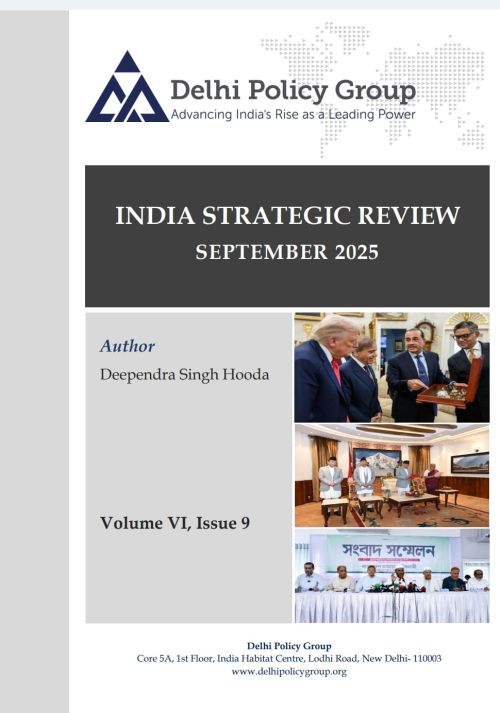India Strategic Review
The ISR features an assessment of key developments, trends, and policies pertaining to India’s immediate and continental neighbourhood and is authored by Lt. Gen. Deependra Singh Hooda (Retd.), Distinguished Fellow for Military Strategy.
On September 17, Pakistan and Saudi Arabia signed a “Strategic Mutual Defence Agreement”, pledging that aggression against one will be treated as aggression against both. The pact is deliberately ambiguous in relation to Pak nuclear capability. For Islamabad, the deal secures vital Saudi financial investment and a place in the Gulf security architecture. Riyadh is hedging against US unreliability and growing regional insecurity. India has indicated that it is assessing the pact’s implications, though Saudi officials have stressed that ties with India remain strong.
Prime Minister Shehbaz Sharif and President Asif Ali Zardari both visited China in September, signing agreements worth $8.5 billion that cover CPEC upgrades, AI, aerospace, and agriculture. China emphasised concerns over the security of its personnel in Pakistan.
Prime Minister Sharif met US President Donald Trump on September 25, praising his role in brokering the India-Pakistan ceasefire earlier this year and advocating a Nobel Prize for him. He was accompanied by Field Marshal Munir, underlining the “hybrid” model of Pak governance. US-Pak ties are clearly improving, but they remain largely transactional as both sides are engaging less on the basis of shared long-term strategy and more on immediate, quid-pro-quo exchanges.
Pakistan faced mass protests in Pakistan-occupied Kashmir (POK) over long-standing grievances, corruption, and neglect. Clashes in Muzaffarabad on September 29 killed at least two people. Authorities imposed communications blackouts and deployed heavy security to contain unrest.
Afghanistan is experiencing a triple crisis of mass refugee returns, aid cuts, and natural disasters. Over 2.6 million Afghans were repatriated from Iran and Pakistan this year. Taliban’s nationwide ban on fibre-optic internet in September has crippled banking and financial systems, limited access to medical care and remittances, and disrupted aviation.
The Bagram Air Base issue escalated during the month, with President Trump demanding its return and citing China’s proximity. The Taliban rejected the idea, and China, Russia, and Iran have strongly opposed any reestablishment of a US base in Afghanistan. Talks on prisoner exchange led to the release of Amir Amiry, a US citizen held by the Taliban.
In Bangladesh, Islami Chhatra Shibir, the student wing of Bangladesh Jamaat-e-Islami, swept university elections, signalling resurgent Islamist politics ahead of the February 2026 national polls. Encouraged by the student polls, the country's Islamic political parties are discussing the formation of an alliance.
Nepal experienced explosive political upheaval after Prime Minister Oli's ban on social media triggered protests among Gen Z. Violent clashes killed dozens of protesters, forcing Oli's resignation on September 9. An interim government led by former Chief Justice Sushila Karki, Nepal’s first woman Prime Minister, has been installed, with elections scheduled for March 2026. India welcomed the change, while China responded cautiously, wary of the sidelining of Nepal’s communist parties.
To read this India Strategic Review, Vol. VI, Issue 9, please see the PDF attached.



